Raheem Sterling: Man City forward on racism, Pep Guardiola & England
- Published
I would tell my 15-year-old self to ignore others' opinions - Sterling
FA Cup final on the BBC: Man City v Watford |
|---|
Date: Saturday, 18 May Kick-off: 17:00 BST |
Coverage: Live on BBC One, BBC Radio 5 live and the BBC Sport website and app; live text commentary and in-play clips on the BBC Sport website. |
Twelve months ago Raheem Sterling was enduring a three-year goal drought for England and his World Cup performances were the subject of much debate.
Almost a year on, he is being talked about as the most important sportsperson in Britain, has been named the Football Writers' Player of the Year and has been arguably Manchester City's most important player as they bid for a historic domestic treble.
Sterling will line up for Pep Guardiola's side at Wembley on Saturday against Watford, with City hoping to add the FA Cup to the Premier League and Carabao Cup they have won this season.
The 24-year-old sat down with BBC Sport's Dan Walker for a wide-ranging interview, discussing topics as diverse as racism, the faith shown in him by Guardiola and post-match phone calls from his mother.
'I didn't think my post would be talked about so much'
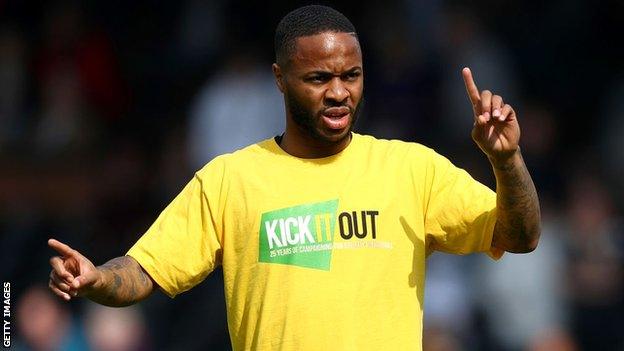
Raheem Sterling has spoken out against racism this season
In December 2018 Sterling was allegedly racially abused by some Chelsea fans during a game at Stamford Bridge. After the match he said on Instagram that newspapers were helping to "fuel racism" by the way they portrayed young black footballers. Four months later, England players were racially abused during a Euro 2020 qualifier in Montenegro. Sterling scored and celebrated by cupping his ears to those who had subjected him and team-mate Danny Rose to taunts.
"I didn't think it (the Instagram post) would be talked about as much as it was. I thought it would be something that would be discussed and then people would sweep it under the carpet. It is not something I initially thought would cause a big debate. It was something I had to get off my chest and I deemed it the right time - the day after a game.
"I am grateful people are taking it in, not just because of me, but because of what players have been facing not just now but over the course of many years.
"It was not for me in terms of my public image. It is actually trying to make people hear what you are trying to say and not just me but other players who have been facing this throughout their careers.
"After that post and hearing from other players about the abuse they received throughout their careers, you sit back and think 'wow, if I didn't do this post I wouldn't have heard that from certain players and certain players I played with I didn't know about this before'. But after the post they have opened up about exactly how it was for them in youth teams and in their professional careers.
"Just to hear stuff like that and know we can make a change in the workplace we love [is important]."
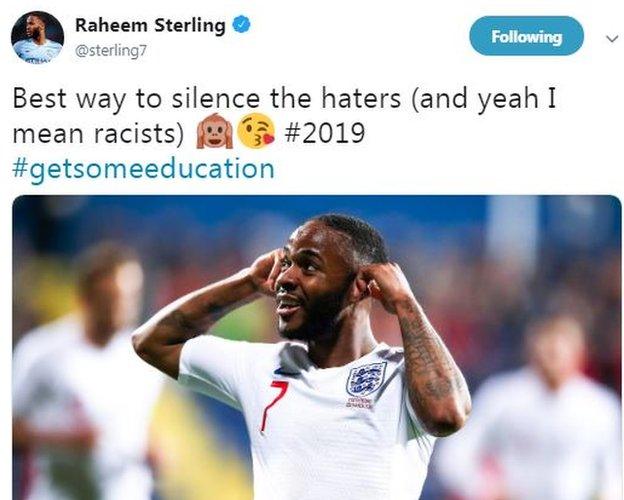
Raheem Sterling tweeted that his goal celebration was a direct response to racist chanting from the Montenegro crowd
A changing relationship with the media
Throughout his career - and particularly following his move from Liverpool to Manchester City for £49m in 2015 - Sterling has occasionally appeared on the front pages of tabloid newspapers. He has been criticised, implicitly at least, for a range of incidents, including having a tattoo of a rifle on his leg, proposing to his girlfriend, purchasing clothes at high-street chain Primark and buying his mother a house.
"Before it was more the petty stuff that used to come out or be said about me.
"It was more me saying 'I don't want to talk to media people and I didn't want to do any interviews'.
"I was against it purely because of how I felt about how I was being treated. Then after games you would have some journalists who would stop you and not try to do an interview but just talk to you. I thought 'actually they are not too bad' and after a while I realised it was nothing personal.
"It was just people trying to do their jobs and you have to be professional in how you are perceived and behave correctly.
"I made a few mistakes growing up, doing silly things, and you learn from that.
"But after the game when you speak to different journalists, you understand they are lovely people just like you and being able to work that connection out and that relationship and speaking a little bit more gets your personality out and gets your true image out."
'When I left Liverpool everyone was saying I was no good'
While Sterling has gone on to establish himself as one of the best players in the Premier League, his first season at Manchester City was far from an unreserved success. Manuel Pellegrini's side finished fourth in the league, lost in the FA Cup fifth round and were knocked out of the Champions League in the semi-finals. They won the League Cup, but Sterling's return of 12 goals in 57 appearances for club and country in all competitions attracted accusations that he did not justify the transfer fee paid to Liverpool by City.
"When I was 14, 15, 16, 17, I was so confident. Then there was a gap between the ages of 17 and 20.
"I was so used to people talking positively about me in terms of football.
"Everything was so nice and there was a switch when I left and everyone was saying 'he's no good'. I hadn't even played for Manchester City but people were saying I was not good enough; he will never be what he thinks he will.
"It wasn't just fans but professional players you looked up to, that you watched on TV when you were a kid. They were all Liverpool supporters and ex-Liverpool players and I get it now, but at the time it was a bit hard for me to take. It was a learning curve.
"You know what you are like, you know right from wrong and you know what you need to improve on. Everyone will have an opinion but I know where I want to go and what I need to do, so it is down to you to carry that out and not get caught up in hearing how good you are or how bad you are."
'The manager has helped me massively'
In the past two seasons under Guardiola, Sterling has scored 35 goals in 67 Premier League starts. He is rarely left out of the starting line-up and his manager described him as "magnificent" after he scored the winning penalty in the Carabao Cup final in February.
"Pep has been massive for me. I have seen how he has set up teams in the past and as a young player coming through I thought this was the perfect place for me to come.
"The first season was a lot of pressure but it was not something I was going to hide away from. It was not something I was ever going to give up on even if it was a rough patch for me. I would go away at the end of the season, look where I went wrong and try to fix it.
"The manager helped me massively in terms of confidence and putting trust in me and being there for me. Since he has come in he has played me in 90% of games and in massive games. I have tried to repay him with hard work, not just going out on the pitch playing and enjoying but also putting in the hard work off it.
"The environment the manager has created is perfect. You have to earn that trust and earn the respect to be in the starting XI. There are no egos here. It is all about hard work and the ability does the talking.
"There is not a single player here who has the mentality that they are better than anyone else. We all know our abilities and all know what we bring to this team. Everyone knows they have to work to show their ability and they are not guaranteed starters."
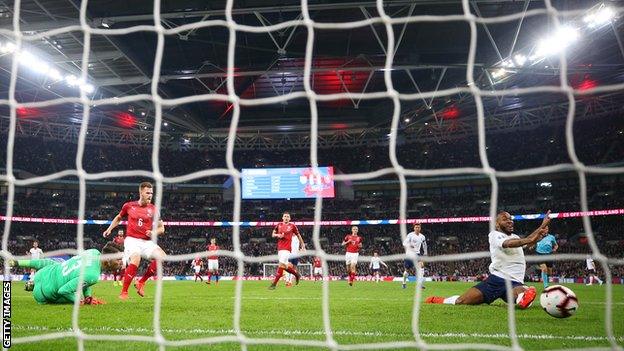
England forward Sterling was raised near Wembley after moving from Jamaica aged five
'I rode past Wembley on my bike when it was being built'
Sterling grew up in Wembley, north London, so playing at the national stadium - both for England and in cup finals - has extra resonance for him. Stepping out against Watford on Saturday will, as always, be a special feeling.
"It is something I keep talking about and it might sound boring but Wembley - seeing the stadium being built - is a massive part of my childhood.
"I remember riding past on my bike and seeing it being built from scratch. Being in love with football at such a young age it was always somewhere I wanted to play. It was always a dream of mine to play in the all white of England at Wembley.
"It is an unbelievable feeling every time I walk out there, especially having gone to school so close by. I used to always talk about football in the classroom. It was always something I wanted to do and something I never let go of. I always thought 'this is for me and there's nothing else for me' and I would do my best to try to become a professional football player.
"I remember for the last England game we were driving on the bus and I saw one of my friends who I am still close to come out of his house as we passed. It reminded me that was somewhere I used to go and chill out and I remember calling him and saying we had just driven past him. Little things like that are surreal."
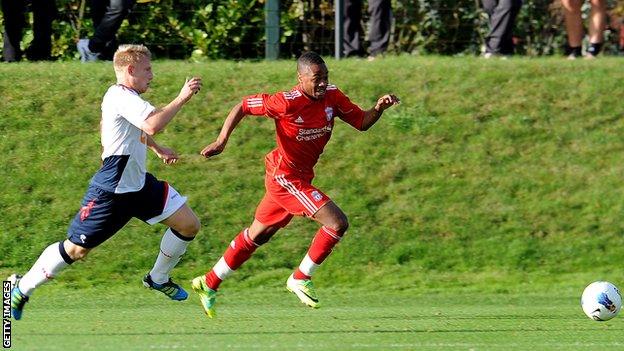
Raheem Sterling (pictured here playing for Liverpool reserves in 2011) moved from QPR to Merseyside at the age of 15
'Middlesex under-16s preferred another winger'
Sterling spent much of his youth career at Queens Park Rangers before joining Liverpool as a 15-year-old for an initial fee of £500,000. Even then, belief was an important part of his make-up.
"I still have the same ambitions as I had when I was kid. I am driven the same way and I am always trying to improve.
"When I was younger I would always have people telling me certain stuff, but I was hard of hearing and wouldn't always take everything in.
"I would take things in how I wanted to interpret it and not how people told me I needed to. That has always been a massive factor for me, to have that resilience to do what I want to do.
"I remember I had a trial for Middlesex a year above and I didn't get in because they preferred another winger. A week or two weeks after that I got called up to England Under-16s and that was a massive turning point for me in that it showed football was about opinions and whether, at that moment in time, someone likes you.
"Going back into school the next day, it had been on Sky Sports News, I'd got two assists and that was a massive first step for me in terms of my belief."
'I try to keep post-match phone calls with mum short!'
Sterling was raised by his mother Nadine. Her involvement in his career continues to this day...
"My family has been a massive part. Everyone has their different experiences but so many things we have been through as a family have been really difficult at times.
"My mum's principles were always: we are there for each other and we can get through anything.
"My sister would look after not just me but also my other little sister as well, and she was just a child herself. Just to know she had that much responsibility on herself - she always went out of her way and I am always grateful for her doing that.
"My mum is always watching games and calls me directly afterwards. I sometimes think 'do I really want to answer this now? Give me a break!'
"But she is always buzzing and I try to keep the conversation as short and sweet as possible. I am not a person who tries to get out of line but my mum and sister, if they see me get too out of place, for sure they will knock me right back down to earth."
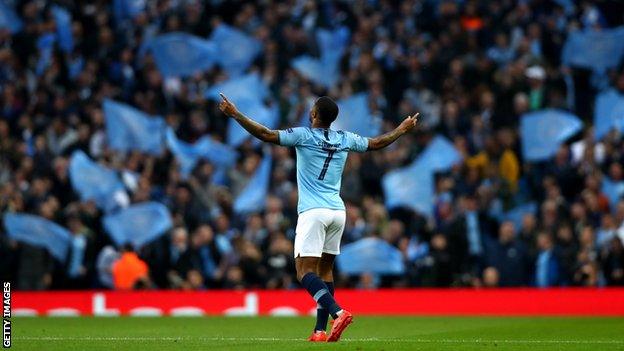
Raheem Sterling scored 17 goals and provided 10 assists in the Premier League this season